Salvador (1986)
Directed by: Oliver Stone
Written by: Oliver Stone, Richard Boyle
Starring: Elpidia Carrillo, James Woods, Jim Belushi, John Savage
USA
AVAILABLE ON DUAL FORMAT BLU-RAY AND DVD: NOW, from EUREKA ENTERTAINMENT
RUNNING TIME: 122 mins
REVIEWED BY: Dr Lenera, Official HCF Critic
Veteran photojournalist Richard Boyle has been taking his camera to the world’s trouble spots for over twenty years, but his fondness for women, booze and drugs, and his colossal arrogance, have given him a reputation that’s left him practically unemployable. Broke and with no immediate prospects, Boyle and his friend, out-of-work disc jockey Doctor Rock , head to El Salvador, where Boyle is convinced that he can scrounge some lucrative freelance work amidst the nation’s political turmoil. However, when Boyle and Rock witness the execution of a student by government troops just as they enter the country, it becomes clear that this war is more serious than they were expecting. Boyle is reunited with an old flame named María, but he has enemies in the country…..
Oliver Stone’s star has somewhat diminished of late, but the director of JFK, Natural Born Killers and Born On The Fourth Of July has always seemed to have as many detractors as well as supporters. Wasn’t it the famous film critic Pauline Kael who said that the thought of having to see another Stone film was instrumental in her retiring? Self-important his work can often he, but the passion and power of much of it I cannot deny. However, there is certainly a case for saying that he never bettered Salvador, which wasn’t his first directorial effort, but was the first one to get widely noticed. Perhaps the best [it ties with The Killing Fields] of the cluster of journalists-reporting-war films that came out during the 1980’s, it succeeds in pretty much everything it sets out to be which include: a look at two losers who kind of blunder through life, an unsentimental study of redemption for an amoral man who gains a conscience, and a stark warning that American military involvement in the affairs of another country never does much good. I don’t think that you have to be in total agreement with the film’s unashamedly left wing stance [though a pretty truthful stance if you read up on the events] to be in agreement with this and wonder why the hell the lessons of the likes of Salvador and Vietman still haven’t been learnt. Fast moving and even humorous in parts, it also manages the hard task of still working as a piece of entertainment despite featuring some grueling moments in what is an amazingly well achieved balancing act. And, last but not least, there’s also the finest ever performance by James Woods in this movie.
It was based on a true story involving a journalist of the same name as Wood’s character, who was also a friend of Stone. While Stone had won an Oscar for Best Screenplay for Midnight Express, neither of his previous directed films Seizure and The Hand had been well received, and he had trouble raising the money. As it was, the budget was quite low, just under $5 million. After Marlon Brando, Paul Newman and Lee Marvin passed, Martin Sheen was cast as Boyle, and Woods was offered the part of Doctor Rock, but Woods convinced Stone that he’d be better in the lead role, and Sheen, uncomfortable with the material, agreed. After El Salvador proved to be too dangerous, Mexico doubled for the country in a tough but fast shoot in which cast and crew often argued, while Woods, who sometimes improvised not to Stone’s liking, and Jim Belushi frequently clashed, their competitive rivalry secretly encouraged by Stone. The two actors met their real-life counterparts, but didn’t get along with them, Boyle and Woods being total opposites. Money eventually ran out and Stone even put a second mortgage on his house until British producer John Daly of the Hemdale Film Corporation provided the funds. Distributors Orion insisted that Stone cut nearly half an hour of material, much of it being sexual or violent such an orgy scene with Rick Boyle and Dr. Rock and a bag of ears casually tossed on to a table. Then Orion decided not to release it anyway so Hemdale did it themselves, though they lacked the muscle to give it a major release and it flopped until being re-release after the commercial and Oscar-winning success of Stone’s Platoon.
Georges Delurue’s pulsating music, a far cry from what we normally associate with this composer, punches you repeatedly in the gut as black and white images of violence in Salvador appears behind the opening titles. Our ‘hero’ – or should that be ‘anti-hero’ – is introduced in his wife’s house where the landlord is evicting her for not paying rent. I can’t imagine Boyle ever helps her out even though he appears to have had a son with her – but then again he never seems to have any money. In fact I don’t think that we actually ever see Boyle pay for anything throughout the whole film. Instead he’s constantly getting others to lend him some [which we know he probably won’t give back], while often lying about his friends to help himself, though his carrying around of [possibly stolen] ‘gifts’ including quite a few expensive watches tends to come in handy when trying to placate someone or even save somebody. Though he’s totally down on his luck, it’s probably entirely his own fault, and seeing this sleazy weasel of a man, this “walking disease of the 60’s”, continually connive for favours and only appearing to be interested in himself is cringe worthy – yet Woods is totally hypnotic in the part, you just can’t take your eyes off him. When Boyle and Rock head for Salvador, where you can “drink drive, can get anybody killed for fifty bucks and the best pussy in the world”, there;s more than a touch of Fear And Loathing In Las Vegas. There’s even a scene where someone takes acid, though the character concerned is Pauline Axlerod, a snobby, right-wing photo-journalist who only cares about looking good before the camera and has her drink spiked by the Rock – though one still laughs.
Boyle soon encounters violence, and while he’s a friend of one military general, he previously made himself an enemy of another, Major Max, by reporting on him carrying out tortures, and who seems to be gaining more and more power. Of course the Americans are backing him because he’s keeping the Commie resistance at bay isn’t he? Boyle wants to make money from graphic photographs, and unlike another journalist John John Cassady[based on the real-life John Holland] he meets, he’s not concerned with finding or revealing any truth, even though he’s not under any illusions as to what’s going on [his exchanges with the ignorant Pauline are both pointed and funny]. At one point he and Cassidy walk through a mass grave taking pictures and talking about how they want to get that one artistic shot that will “capture the reason for these people’s suffering”, even talking about another photographer’s work and impact – yet in the next scene Boyle leaves the photos he took with a humanitarian group, hoping it will help in their efforts to identify the dead, something that he does strictly to get a favor from Cathy one of the workers there. However, he still carries a torch for Maria, and after some more vicious events becomes determined to take her out of the country, whereupon Woods has his best scene, both comic and just slightly touching, and which he improvised, where Boyle goes for confession. What he says is partly fake and obviously more lies, but you get the impression that after a while he really does seem to want to redeem himself – and he certainly loves Maria, whom he says is the only good thing in his life. Meanwhile Rock is too busy getting drunk and whoring. James Belushi is also very good in this film, even though he’s mostly required to act plastered for much of the time, and even takes a back seat at times with Cassdy sometimes taking over as Boyle’s companion.
The cutting down of the film seems to have resulted in a few odd scene transitions and even some poor continuity instances, though I only noticed the latter this time around because I was watching the film with a more critical and concentrated eye. I’d seen Salvador four or five times before, and never noticed it before as I was gripped by what was unfolding in front of me. The small budget didn’t allow for large numbers of extras, but creative editing and strong staging means that the action scenes in the second half still work, and moments like the raping and killing of two aid workers and two nuns are quite harrowing even if we don’t see all the detail, because there’s a real immediacy about it all, something helped greatly by the camerawork of Stone regular Robert Richardson which expertly marries loose, documentary-style coverage to steadier composition of a more classical kind without the effect being jarring. We seem to witness many of the atrocities through Boyle’s rather hazy viewpoint. Perhaps the center piece is the real-life assassination of Archbiship Romero, though why Stone had to depart greatly from the way it actually happened is strange considering that the truth is dramatic enough. And Stone can’t resist putting in a scene in which Boyle tells two American officials that he knows exactly what’s taking place, in the process becoming Stone’s mouthpiece as he lectures the viewer on his take on things. It’s just not necessary, and elsewhere Salvador does generally succeed in presenting a particular viewpoint without it seeming like a polemic – though it’s interesting that the line “you’re becoming just like them”, which criticises the violence of the rebels, came from Boyle, not Stone.
Tony Plana, Jorge Luke and Ramón Menéndez ably provide hissable villainy from the Salvadorian side while Colby Chester, Will MacMillan showcase a more insidiously nasty side from the Americans. Only Elpidia Carrilo, who may not a familiar name to many but whom many will recognise from Predator, lets the side down slightly. Aided greatly by Delerue’s diverse score which positively Morriconian in its suspense passages but also gives us a lovely guitar theme for Maria, Salvador is pretty stunning film-making all-round, and it doesn’t even seem particularly dated. Aside from the lack of digital technology and the age of the performers, it could pass for a film made today – while of course its relevance seems destined to never die.
Salvador comes to UK Blu-ray in a superbly film-like transfer full of well managed grain and retaining that 80’s look despite the high amount of detail. A few shots look a little soft [mainly close-ups] but only a few. As I only have a standard set-up I watched the majority of the film with its mono audio track which was more than satisfactory with perfect balancing of dialogue, sound and music. A few switches over to the 5.1 track revealed it to be very faithful to the mono track if slightly quieter, though I honestly think that the mono is preferable unless you have surround sound.
Eureka have ported over all the special features from the DVD, which were in turn used on the Region ‘B’ German and Australian Blu-ray releases, and on the Twilight Time Region ‘A’ disc which also offered the isolated score. Eureka don’t have the latter, but they do present two lengthy audio interviews with Stone which more than compensate. First up is his old audio commentary. Stone always gives good value on his talk tracks, and this one, despite the usual gaps, is as informative as you would expect. Despite speaking in a very laid-back fashion which belies his ‘shouting at the top of his voice’ image, Stone is always interesting as he relates how the film was set up and made [it seems that he often lied to get it set up], tells plenty of stories [love the one about the real Boyle living at his house for a month and Stone’s wife kicking him out after he drank baby food thinking it was beer, and wait till you hear about Woods walking out], and provides much historical background too. He admits changing things and says that the film would be less ‘on the nose’ if he made it now, but is rightfully proud of it despite it being it very difficult to make.
The hour long audio interview with Stone in London is also placed over [the first half of the] film like a commentary. Taking place after a preview of the film, there’s little overlap with the actual commentary, though some may find that too many of the questions from both the interviewer and the audience revolve around politics. It didn’t bother me, and some interesting facts come out, like Salvador being unbelievably rejected by Cannes because it was “too Rambo-like“. He also talks about some of the problems making Platoon, and has some difficulty understanding some of the more complex, even convoluted, questions. I had trouble understanding nearly all of them, as they are incredibly quiet. Still, this is insightful stuff. The 41 minute 1996 interview, which we actually see, is supposedly only highlights. This is disappointing, though I detected no obvious edits. Taking place just after a screening of one of Stone’s most underrated movies Heaven And Earth, the emphasis is on Stone’s Vietman ‘trilogy’, with Salvador only mentioned once or twice, but ought to be of interest anyway. Again, there’s little overlap of material, and kudos to Eureka for locating these extra two treats.
The last two special features are from the DVD, but it was the first time I’d seen them. The 64 minute Into The Valley of Death chronicles the making of the film, and a hell of a lot is chronicled, making this one of the most interesting ‘making ofs’ I’d seen in some time, with never a dull moment. Stone, Woods, the real Boyle, and the real-life American ambassador to El Salvador at the time Robert White [who says that he never agreed under pressure to increased military activity unlike his differently named counterpart in the film] do most of the talking, though others chip in here and there. We learn that Woods was in mortal danger not once but twice, that Stone gave the El Salvadorian army a fake script making them the heroes so he could use their gear, and that Menéndez tried to ‘pick up’ the Mexican censor who was often on set, concerned about how the film portrayed Mexico [even though it was doubling for El Salvador]. There’s a bit of behind the scenes footage and clips from a deleted scene, more of which can be seen in the Deleted and Extended scenes section which I was especially excited to see. The orgy and ear scene is in there, a comic but in a way really horrific scene in which Max and an aide meet the two heads of a public relations team [you will truly cringe] who are willing to sacrifice any morality to improve the image of a client who has lots of money, and a final and unusually friendly moment between Boyle and Axelrod which should definitely have been left in the film. In fact all the cut material is very strong, and it’s a shame that Stone doesn’t want to put it back in as Salvador would then be even better.
Salvador still has stunning impact and is almost a genuinely great movie, and all the special features on Eureka’s release are essential two. Thoroughly Recommended!
SPECIAL FEATURES
* Feature length audio commentary with director Oliver Stone
* A rarely heard, lengthy audio interview with Oliver Stone from 1986
* An extensive archival interview with Oliver Stone at the BFI in 1994
* Into The Valley of Death – A documentary on the making of Salvador
* Deleted and Extended scenes
* Original theatrical trailer
* A collector’s booklet featuring a new essay by critic and journalist Barry Forshaw; extracts from the films original pressbook; and archival imagery

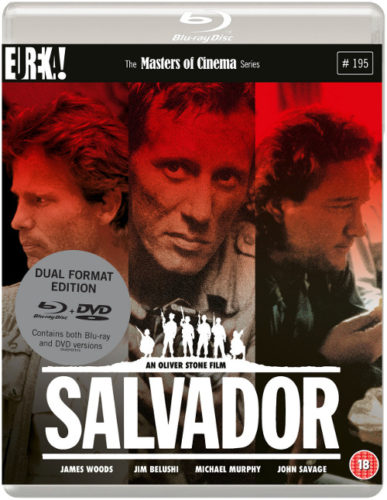
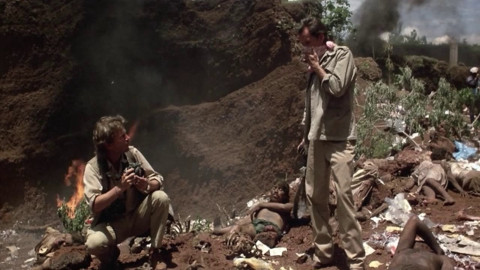
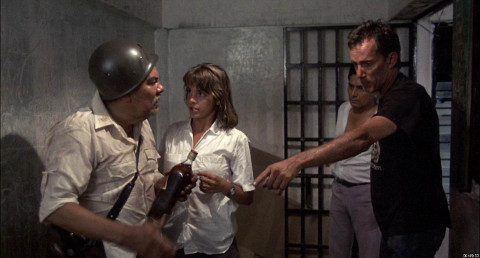



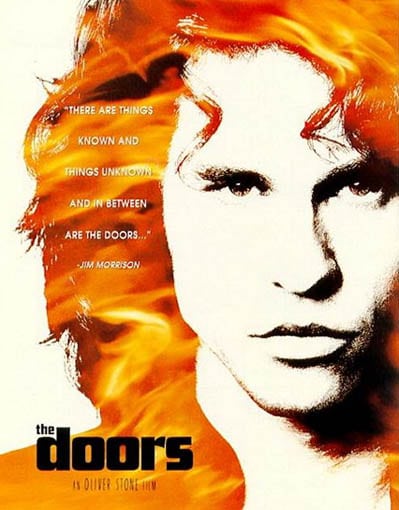
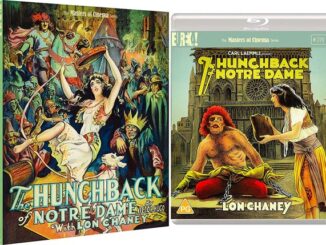
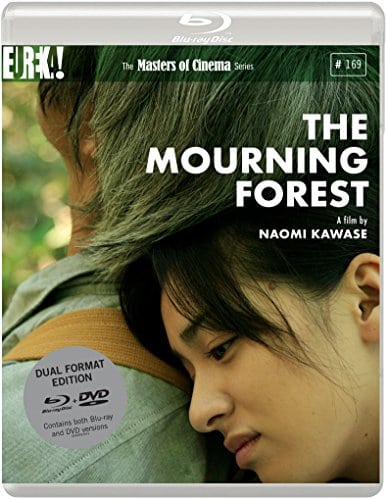
Be the first to comment